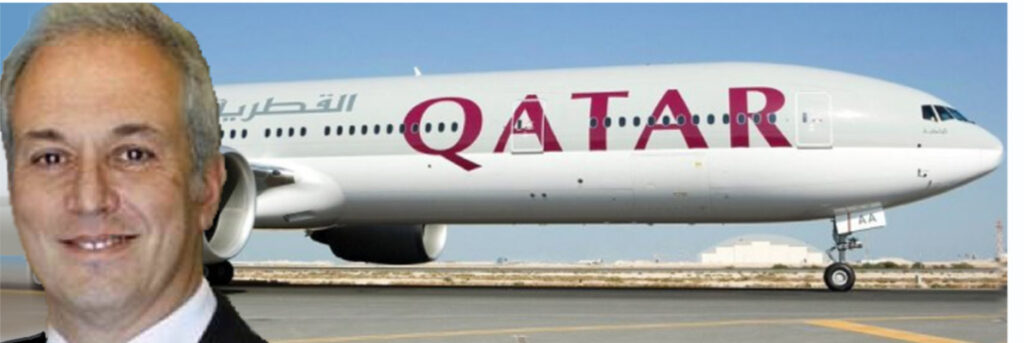As much of the world’s airline industry inches forward and returns to the air during the seemingly never-ending coronavirus epidemic, one carrier is forging ahead by leaps and bounds – Qatar Airways. And the latest notch on its belt is Toronto flights, launching tomorrow (July 4).
Three times weekly service between Pearson International and QR’s Doha hub joins a quartet of weekly flights to Montreal, meaning that Canada will now boast daily flights to the Qatari capital. The Toronto service will be operated by an Airbus A350-900 offering 36 seats in Business Class and 247 seats in Economy Class.
With an increased schedule of 10 weekly flights from New York also commencing this week (July 2), the state-owned airline of Qatar accelerated the rebuilding of its network in June and now operates 550 weekly flights to more than 49 destinations, including six US gateways.
The brand new Toronto flight and flurry of relaunches follows a pandemic period in which the airline continued to operate part of its scheduled network and added exclusive charter flights in a bid to help re-patriate 1.8 million passengers globally (25,000 Canadians among them), and continued to fly cargo, including necessary medical supplies and aid.
The result, airline Sr. VP The Americas Eric Odone told Travel Industry Today, was the creation of a new “hybrid network” and the realization that “in the last three months we have become the largest airline in the world.”
With over 15,000 flights flown during the period to help people during the pandemic (and 100,000 free tickets issued to medical workers), Odone adds, “It was quite a rewarding experience, when a lot of airlines were not flying. There’s something very emotional about taking people home.”
An added benefit of flying through the crisis, he said, was the airline’s ability to hone its bio-safety protocols, which now include the introduction of Personal Protective Equipment (PPE) suits for cabin crew while onboard, as well as a modified service that reduces interactions between the passengers and the crew inflight. Passengers are also required to wear face coverings inflight.
Similar measures have also been taken at Doha’s Hamad International Airport (HIA) where stringent cleaning procedures and applied social distancing measures have been implemented throughout its terminals. All passenger touchpoints are sanitized every 10-15 minutes and every boarding gate and bus gate counter is cleaned after each flight. In addition, hand sanitizers are provided at immigration and security screening points.
As the airline’s network continues to re-populate – the airline had originally hoped to be back in 80 destinations by the end of June subject to regulatory approvals and the re-opening of domestic air spaces – Odone notes that Qatar Airways never altered its four-times weekly schedule to Montreal.
In fact, the carrier added temporary charters to Toronto and Vancouver as well, “which we’ve never done before,” he says, adding the carrier also has a partnership in Canada with Air Canada. The Toronto flights proved prescient.
Most passengers on the routes during the pandemic tend to be nationals returning home (through the Doha hub). “There’s not a lot of business travel. It’s a different class of passenger, that’s for sure,” says Odone. “You would think that four months down the line, people would have found a way of going home, but not all them. And then you have all the all the issues with colleges as the graduation and non-graduation happens, there’s more people needing to go home.”
And he adds that there are still Canadians coming home to Canada.
As to when the airline industry and Qatar Airways will be able to return to normalcy, he admits, “no one knows.” But he adds, “People still want to travel and as soon as we’ve seen a country re-opening, we see a surge of traffic there.”
At the same time, Odone says the airline has seen a spike in business class interest as passengers look for the safest means to travel, but also heading to “not logical” destinations like the Maldives, the Seychelles and Bali, adding, “That’s a good sign: It shows that people have faith in… the Qatar Airways business class for the purposes of social distancing and comfort.”
In a general sense, Odone says he expects that many of the new health and safety protocols adopted by airlines will remain when the pandemic ends.
“People will still be worried about viruses afoot,” he says, adding, “Depending on medical evolution, maybe some of those measures we will be able to stop them, but I’m sure that a lot of them will stay. The focus on airports, I’m pretty sure that will stay. The general status of hygiene of airlines and airports throughout the world has been raised as a consequence of the pandemic.”
Also continuing, at least until the end of the year, will be the airline’s “Rely On Us” program, designed to mitigate passengers’ reluctance to book flights during the pandemic due to cancellations and uncertain flight schedules. The peace of mind policy allows passengers to make unlimited date changes and switch their destination as often as they need if it is within 5,000 miles of the original destination. The airline will not charge any fare differences for travel completed before Dec. 31, 2020 and all tickets booked for travel up to Dec. 31 will be valid for two years from the date of issuance.
“We want to assure people,” says Odone, “that buying a ticket is not an issue in any way.”
Qatar Airways is a member of the oneworld alliance and was named ‘World’s Best Airline’ by the 2019 World Airline Awards, managed by international air transport rating organization Skytrax.

